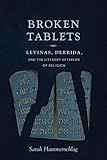Broken tablets : Levinas, Derrida, and the literary afterlife of religion / Sarah Hammerschlag.
Material type: TextPublication details: New York : Columbia University Press, 2016.Description: 1 online resourceContent type:
TextPublication details: New York : Columbia University Press, 2016.Description: 1 online resourceContent type: - 9780231542135
- 0231542135
- 194 23
- B2430.L484 H36 2016eb
- online - EBSCO
| Item type | Current library | Call number | URL | Status | Notes | Barcode | |
|---|---|---|---|---|---|---|---|
 eBook
eBook
|
Biblioteca "Angelicum" Pont. Univ. S.Tommaso d'Aquino Nuvola online | online - EBSCO (Browse shelf(Opens below)) | Online access | Not for loan (Accesso limitato) | Accesso per gli utenti autorizzati / Access for authorized users | (ebsco)1341881 |
Online resource; title from PDF title page (EBSCO, viewed September 20, 2016).
Includes bibliographical references and index.
What must a Jewish thinker be? -- Levinas, literature, and the ruin of the world -- Between the Jew and writing -- To lose one's head: literature and the democracy to come -- Literature and the political-theological remains -- There is not a pin to choose between us.
Over a span of thirty years, twentieth-century French philosophers Emmanuel Levinas and Jacques Derrida held a conversation across texts. Sharing a Jewish heritage and a background in phenomenology, both came to situate their work at the margins of philosophy, articulating this placement through religion and literature. Chronicling the interactions between these thinkers, Sarah Hammerschlag argues that the stakes in their respective positions were more than philosophical. They were also political. Levinas's investments were born out in his writings on Judaism and ultimately in an evolving conviction that the young state of Israel held the best possibility for achieving such an ideal. For Derrida, the Jewish question was literary. The stakes of Jewish survival could only be approached through reflections on modern literature's religious legacy, a line of thinking that provided him the means to reconceive democracy. Hammerschlag's reexamination of Derrida and Levinas's textual exchange not only produces a new account of this friendship but also has significant ramifications for debates within Continental philosophy, the study of religion, and political theology.


